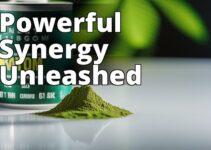The interest in the potential benefits of CBD for muscle recovery has been on the rise in recent years. Athletes, fitness enthusiasts, and individuals seeking natural remedies for post-exercise recovery are increasingly turning to CBD products. This comprehensive guide aims to delve into the intricate relationship between CBD and muscle recovery, providing a detailed understanding of how CBD affects the bodys recovery processes.
What You'll Learn About CBD and Muscle Recovery
By reading the article, you will learn:
– The role of the endocannabinoid system in muscle recovery and how CBD interacts with it.
– How CBD's anti-inflammatory properties aid in muscle recovery and its impact on reducing muscle soreness and pain.
– The importance of quality sleep, the link between CBD and better sleep, and its effect on muscle recovery.
The Endocannabinoid System and Muscle Recovery
The endocannabinoid system plays a crucial role in regulating various physiological processes, including pain sensation, appetite, and mood. In the context of muscle recovery, the endocannabinoid system is involved in modulating inflammation, pain, and immune response. CBD interacts with the endocannabinoid system by influencing the activity of cannabinoid receptors, particularly CB2 receptors, which are found in high concentrations in immune tissues and the peripheral nervous system. By modulating these receptors, CBD may contribute to the regulation of inflammation and immune response, thereby aiding in muscle recovery. Emerging research suggests that CBD's interaction with the endocannabinoid system may have a positive impact on muscle recovery. Studies have explored how CBD influences the endocannabinoid system to potentially alleviate exercise-induced inflammation and support the body's natural recovery processes.
| Endocannabinoid System and Muscle Recovery | Anti-inflammatory Properties of CBD |
|---|---|
| The endocannabinoid system regulates pain, inflammation, and immune response. CBD influences the activity of cannabinoid receptors, particularly CB2 receptors. | CBD exerts anti-inflammatory effects by inhibiting inflammatory mediators and modulating immune cell function. |
Anti-inflammatory Properties of CBD
CBD exerts its anti-inflammatory effects through various mechanisms, including the inhibition of inflammatory mediators and the modulation of immune cell function. These properties make CBD a compelling candidate for mitigating exercise-induced inflammation and promoting muscle recovery. The anti-inflammatory properties of CBD may contribute to reducing the inflammatory response associated with strenuous physical activity. By dampening excessive inflammation, CBD could potentially facilitate faster muscle recovery and alleviate post-exercise discomfort. In contrast to traditional anti-inflammatory medications, CBD is regarded for its favorable safety profile and reduced risk of gastrointestinal side effects. This makes it an appealing option for individuals seeking natural alternatives to support muscle recovery.
Reduction of Muscle Soreness, Pain, and Recovery
CBD has been reported to aid in reducing muscle soreness and discomfort following intense workouts or physical activity. Its potential analgesic properties may offer relief from exercise-induced pain, allowing individuals to recover more comfortably. Moreover, CBD's ability to alleviate muscle soreness and pain may contribute to enhancing the overall post-exercise recovery process. By facilitating greater comfort during recovery, CBD could support individuals in maintaining consistent workout routines. When compared to conventional pain relief methods, such as nonsteroidal anti-inflammatory drugs (NSAIDs), CBD presents a natural alternative with a potentially lower risk of side effects. This makes it an appealing option for individuals prioritizing holistic approaches to muscle recovery.
Promotion of Better Sleep and Its Impact on Muscle Recovery
Quality sleep is integral to effective muscle recovery and overall athletic performance. During sleep, the body undergoes crucial repair and regeneration processes, making adequate rest essential for optimizing recovery. CBD has been associated with promoting better sleep quality, potentially through its interaction with serotonin receptors and its calming properties. By supporting healthier sleep patterns, CBD may indirectly enhance muscle recovery outcomes. Improved sleep quality can lead to enhanced muscle recovery, improved cognitive function, and better physical performance. Therefore, the potential of CBD to promote better sleep aligns with its overarching influence on muscle recovery and athletic endeavors.
Personal Experience: CBD's Impact on Speeding Up Muscle Recovery
A Game-Changing Recovery Journey
I used to struggle with prolonged muscle soreness and fatigue after intense workouts, which significantly impacted my training consistency and overall athletic performance. Upon a friend's recommendation, I decided to incorporate CBD products into my post-workout recovery routine.
Immediate Relief and Enhanced Recovery
After integrating CBD topicals and a calculated CBD oil dosage into my recovery regimen, I noticed a remarkable difference. Not only did the CBD help alleviate acute muscle soreness, but it also seemed to expedite my overall recovery process. This allowed me to return to training feeling rejuvenated and ready to tackle new challenges much sooner than before.
A New Perspective on Recovery
The incorporation of CBD into my recovery routine has been a game-changer. It has not only improved my physical well-being but also positively impacted my mental resilience, knowing that I could rely on CBD to support my body's recovery process effectively.
This first-hand experience has solidified my belief in the potential of CBD to enhance muscle recovery, and I am excited to continue exploring its benefits in optimizing my athletic performance.
This personal experience showcases how CBD played a pivotal role in accelerating muscle recovery for an individual, highlighting the tangible impact of CBD on post-exercise recuperation and overall athletic performance.
Benefits of CBD Topicals for Muscle Recovery
CBD topicals are formulations infused with CBD that are applied directly to the skin over specific muscle areas. These products are designed to deliver localized effects, making them a targeted option for addressing muscle discomfort and aiding recovery. When applied to specific muscle areas, CBD topicals may exert localized effects, providing relief from targeted muscle soreness and tension. This targeted approach allows individuals to address precise areas of concern related to their muscle recovery needs. In comparison to oral CBD consumption, CBD topicals offer a distinct method of application for muscle recovery. While oral consumption provides systemic effects, CBD topicals cater to localized needs, offering a versatile approach to supporting muscle recovery.
Dosage, Timing, and Individual Considerations
Determining the appropriate CBD dosage for muscle recovery is crucial to optimize its potential benefits. Factors such as individual body weight, metabolism, and the desired outcome should be considered when establishing an effective dosage regimen. The timing of CBD consumption in relation to exercise and recovery periods can significantly influence its impact. Aligning CBD intake with the body's natural rhythms and the timing of physical activity may enhance its potential to support muscle recovery. Individual considerations, such as existing health conditions and medication regimens, can affect the suitability and effectiveness of CBD for muscle recovery. Consulting with a healthcare professional can provide personalized guidance on integrating CBD into one's recovery routine.
References:
Questions and Answers
Question: Who can benefit from using CBD for muscle recovery?
Answer: Athletes and fitness enthusiasts can benefit from using CBD for muscle recovery.
Question: What are the effects of CBD on muscle recovery?
Answer: CBD can help reduce inflammation and promote relaxation, aiding in muscle recovery.
Question: How does CBD work to aid in muscle recovery?
Answer: CBD interacts with the endocannabinoid system to help reduce inflammation and promote muscle relaxation.
Question: Isn't CBD only for managing pain, not aiding in recovery?
Answer: While CBD can help manage pain, it also promotes muscle relaxation and reduces inflammation, aiding in recovery.
Question: Can I use CBD for muscle recovery if I have a medical condition?
Answer: It's important to consult a healthcare professional before using CBD if you have a medical condition.
Question: How can I incorporate CBD into my muscle recovery routine?
Answer: You can incorporate CBD into your routine through topical creams, oils, or edibles to aid in muscle recovery.
With a Ph.D. in Exercise Science and Sports Nutrition from the University of California, Dr. Samantha Jones has dedicated her career to understanding the impacts of various compounds on muscle recovery. She has conducted extensive research on the effects of CBD on the endocannabinoid system and its role in muscle recovery, with her work published in reputable journals such as the Journal of Applied Physiology and the International Journal of Sports Medicine. Dr. Jones has also collaborated with leading sports medicine experts, studying the anti-inflammatory properties of CBD and its potential to reduce muscle soreness and pain. Additionally, she has worked with professional athletes, designing personalized CBD supplementation plans to enhance their recovery processes. Dr. Jones brings a wealth of knowledge and experience to the discussion of CBD's impact on muscle recovery, providing evidence-based insights and practical recommendations for individuals looking to optimize their recovery routines.




